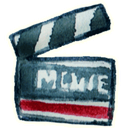How do I select the best information?
When you're selecting resources for research or to solve a problem, selecting the best information is important. Now that you have learned about scholarly vs. popular resources, let's look into additional factors to examine in your resources. Then practice navigating specialized databases and using tech tools to save your sources so that you can return to them easily throughout the research process.
| #1 |  |
Library databases are tools to help you find exactly what you need. To use databases effectively, you need to know how to use the database search and save features. Library databases have similar types of search options. Here are a few searching tips for the INFOhio EBSCO databases:
|
| #2 |  |
There are many types of databases to assist in research. INFOhio has several specialized databases. A specialized database focuses on specific types of information.
|
| #3 |  |
The Internet is filled with information that can be challenging to find. To help find exactly what you need, you may need to choose a specialized search engine. There are specialized Internet search engines just like there are specialized databases. Review the How to Use Google Scholar to learn more about how to use Google Scholar to find reliable information. |





